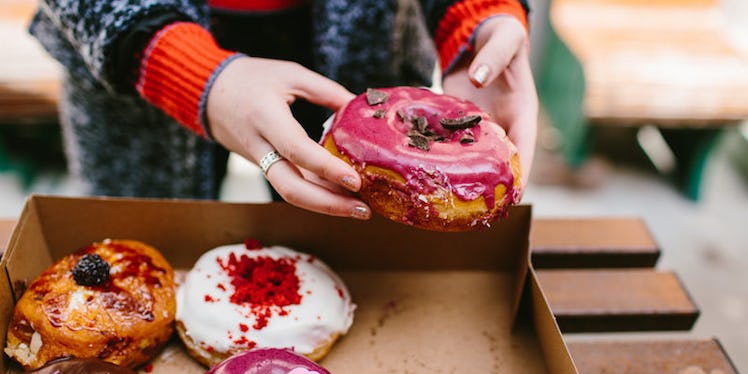
Losing Weight Can Be As Simple As Changing The Way You Talk About It
In college, losing weight was a top priority for me. This was before I started educating myself about health.
Dieting was tough when you had to eat at the dining hall regularly. It wasn't the junky, fatty foods that were a problem for me, however. It was the dessert table.
If you have ever been inside of a college dining hall even once, you know what I'm talking about.
Every damn time I went to grab a meal, I swiped a cookie (or five) on my way out. It made it really hard for me to start losing weight.
Forget ice cream, cake and pastries. Chocolate chip cookies are, hands down, my favorite dessert.
Now that you know about my addiction, you can imagine how hard it was to tell myself every day, "I have to avoid the cookies."
But sticking to that dumb rule was even harder. Why? Because of the language I was using.
In a video from Business Insider, Susan David, a psychologist at Harvard Medical School and author of "Emotional Agility," explained how having "have-to" goals sabotages everything we're trying to accomplish. According to David, we should set "want-to" goals instead.
She says,
We start trapping ourselves into 'have-to' language... We become attracted to the very thing we are trying to avoid.
And that's exactly what happened to me.
Anytime I ate in the dining hall, I couldn't stop thinking about NOT eating cookies. According to Davis, my brain already decided I was going to eat those cookies before I even tried to avoid them. Damn.
Making yourself feel like you have to do something never works.
Davis explains,
Have-to goals that are generated by a sense of obligation or shame actually ramp up temptation.
Yup. That sounds about right.
If only I knew then how to set a "want-to" goal instead of pressuring myself, I might have had a healthier outlook on weight loss before I graduated.
Confused about what a "want-to" goal is? David describes it simply:
[A want-to goal] is driven by an internal intrinsic desire that is of value and connected fundamentally with what we want... A want-to goal actually ramps down temptation.
If I had a deeper connection to the desire to lose weight, it would have become a different type of priority for me.
Back then, I just wanted to look like a Victoria's Secret model.
Now? I'm just happy nothing's wrong with me and my body is healthy enough to do the things I love, like running and snowboarding.
I wish I could go back and tell my freshman year self, "You don't have to 'look hot' for anyone." Looking hot is just something on the surface that doesn't bring real happiness.
Wanting to be healthy in order to live a long life and do the things you love is a much better reason to cut out sweets.
Once you start thinking about it that way, making healthier choices is so much easier. It becomes a pleasure instead of something to beat yourself up about.
And yes, I will still have a cookie (or five) every once in awhile.
But I don't feel shame or guilt about it anymore because those occasions are few and far between.